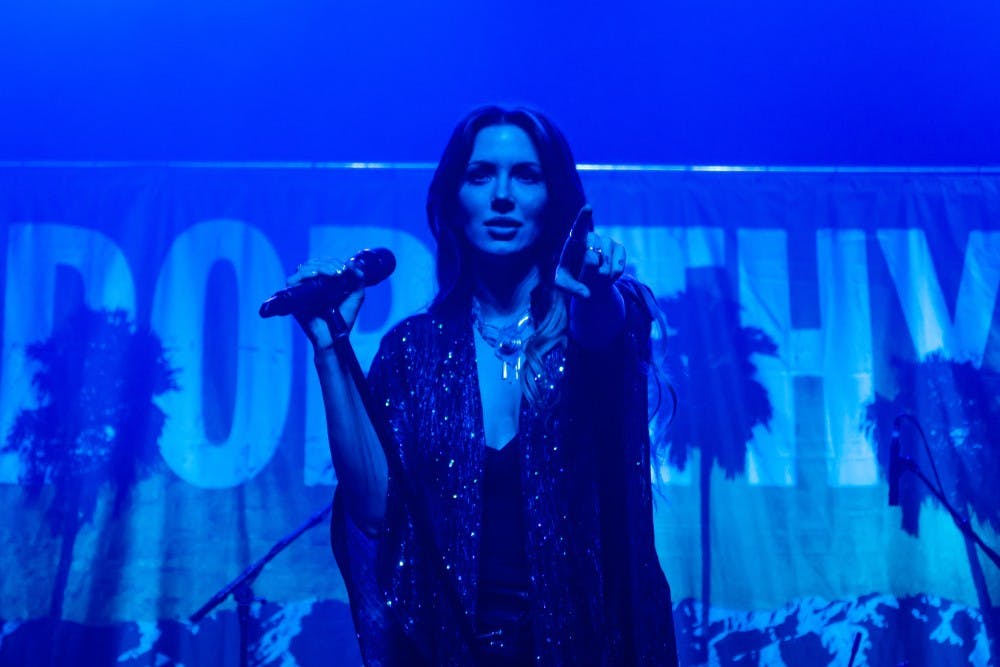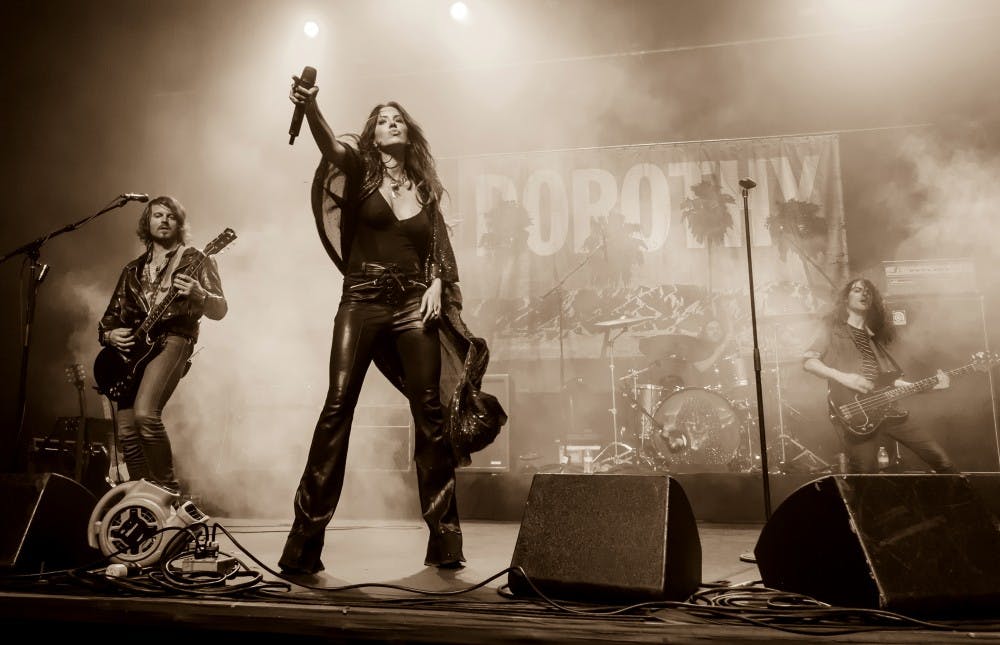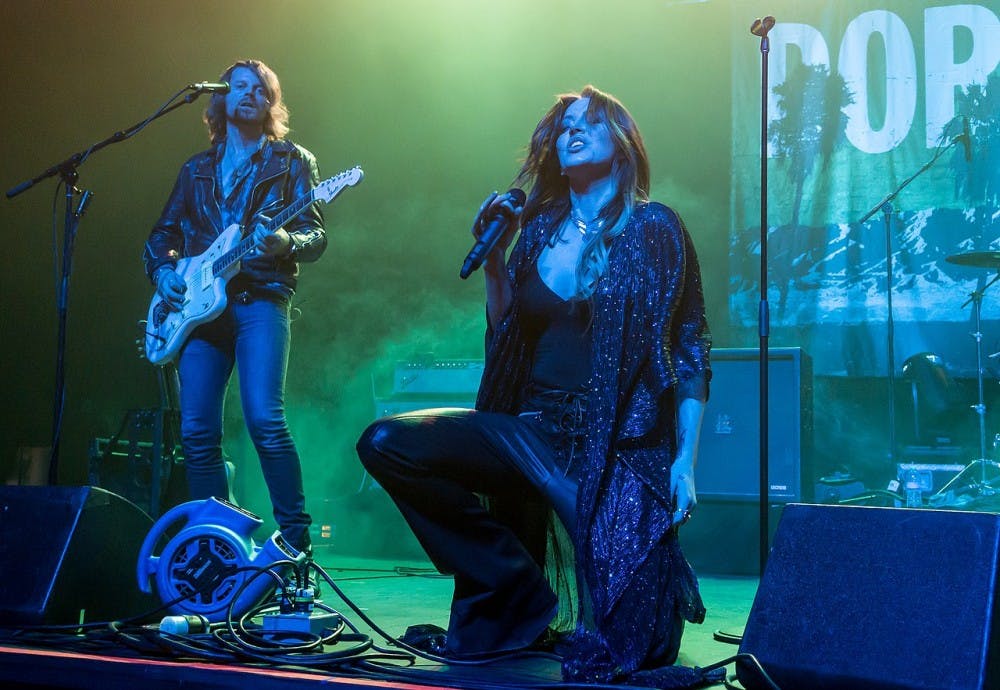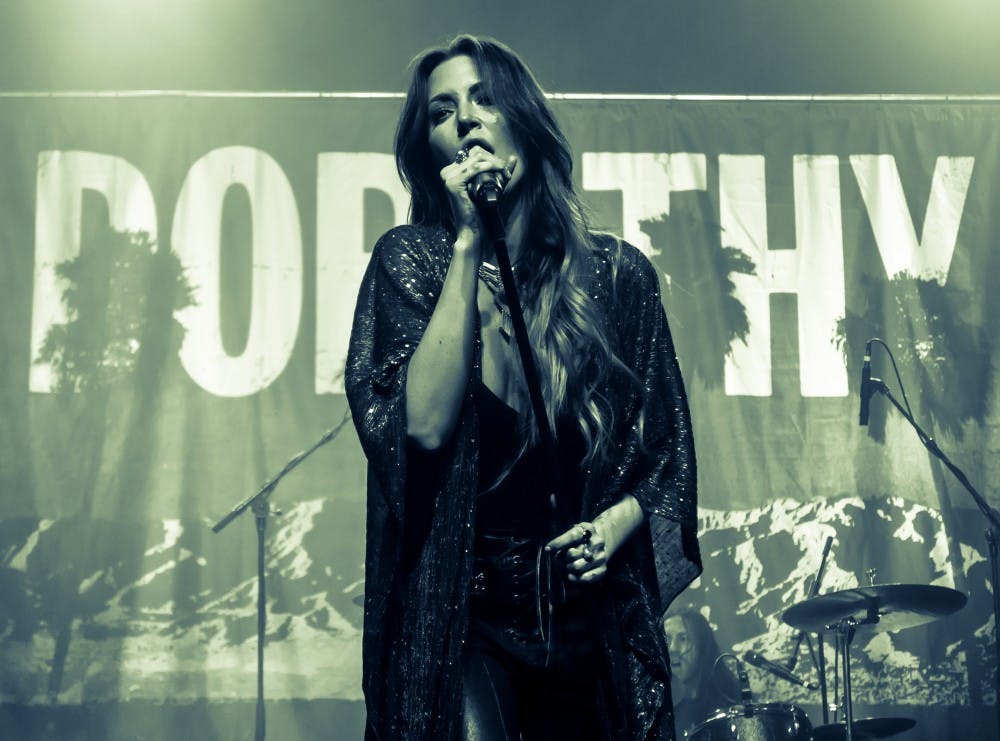The smell of leather was thick in the air, coming off of the battered jackets and beer–soaked combat boots of every aging hard rocker in the crowd. Everyone that packed into the Theatre of Living Arts (TLA) this past Saturday for rock band Dorothy’s sold out show started the evening dressed in all–black, although several would go on to buy and wear opener Spirit Animal’s “banana cream”—not yellow, they insisted—t–shirt. The population density of the venue allowed little room to dance, but did nothing to deter the concertgoers from flipping their hair, swaying their lighters, and pumping the devils’ horns all in time with the heavy riffs, punchy drum beats, and lead singer Dorothy Martin’s cutting vocals.
Up and coming blues rock band The Damn Truth opened for Dorothy just on the Philadelphia tour stop, bringing their own brand of heavy, dirty rock to the stage. Comparisons to Dorothy would be easy, given the band’s 60’s and 70’s–inspired aesthetic, all shaggy hair and floral shirts, and a female lead singer who roared and wailed better than most of her male contemporaries. But to actually compare the two bands would limit the garage rock resurgence. Grace Slick and Janis Joplin could coexist, why not two modern female–fronted hard rock bands?

Justin Higuchi // CC by 2.0
When Spirit Animal took the stage next, it was the embodiment of “and now for something completely different.” While they were bookended by shredding guitars and impressive vocal ranges, Spirit Animal itself sounded more like the Offspring than the Runaways. This is not to say that they were bad: If anything, their lighter, bouncier sound broke up the night in an appropriate manner, and between frontman Steve Cooper’s goofy onstage charm and his vocal rhythm, even the most hardened members of the crowd were nodding in time with closing song “Yeah!”
Then came Dorothy Martin, with a haze of smoke circling her and a devilish look on her face.
When Dorothy last came to the TLA in January 2018, they had only released one album, 2016’s ROCKISDEAD, an album that proved its title to the contrary. When their sophomore LP 28 Days in the Valley was released last summer, the frontwoman described it as “a lighter and brighter feel, with less metal influence and more Stones.” While the album recordings of 28 Days certainly feel more mellow than their debut, everything heard live has Dorothy’s particular brand of hard rock flare, from the belted, passion of “Freedom” to the haunting, gothic guitars on “Medicine Man.”

Justin Higuchi // CC by 2.0
Dorothy’s love for the City of Philadelphia shone through in their performance, and even in their songs. Martin, who was born in Hungary and formed her eponymous band in Los Angeles, put a song called “Philadelphia” on 28 Days. “I have no idea why I named it that,” she admitted while introducing the song, “but I like it.” Besides the song, Dorothy’s love for the city came through in the energy they gave their set, not just in Martin’s vocals but in the instrumental breaks. There was an extended bridge in “Ain’t Our Time to Die” and a shirtless drum solo by Jason Ganberg, not to mention an instrumental jam session between “Medicine Man” and “Whiskey Fever” to show off the talents of guitarists Owen Barry and Eli Wulfmeier and bassist Eliot Lorango. While Dorothy may be named after its frontwoman, it would be absurd to squander the talents of the ensemble behind her, so Martin gives them space to show off a bit.
With the closing song “Freedom,” after which the tour was named, the band gave themselves fully to the music. Martin did more than hit every note; she clocked them in the jaw and across the room while the rest of the band shredded on guitars and basses and pummeled a drum kit to near–oblivion. An encore seemed almost unnecessary, perhaps just as a formality, but then the band returned to the stage a few moments later for “Dark Nights,” Dorothy’s signature survival song.

Justin Higuchi // CC by 2.0
Like Greta Van Fleet, Dorothy has been associated with a return to the rock music of the 60s and 70s, the Janis Joplin and Led Zeppelin of 2019, and the audience seemed to reflect that theory. Most came of age either during the height of hard rock or in the grunge scene of the 90s. But it would be wrong to reduce Dorothy to a rehash of an older generation. Classic rock certainly influenced their sound, as is evident with the Doors–sounding “Philadelphia” and a Patti Smith–reminiscent “Ain’t Our Time to Die,” but the band continues to evolve and look both forward and inward with their songwriting. Contrast the thumping bassline of breakout single “Down to the Bottom” with the slower “Pretty When You’re High,” designed to highlight Martin’s vocals. As long as they keep writing music and playing sold–out shows with all the energy and love they have to give, in twenty years, a band should be so lucky to be called the Dorothy of their generation.

